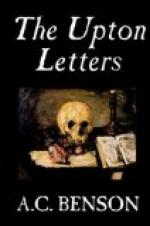But King and Prout, the two principal masters—it is they who spoil the taste of my food and mingle my drink with ashes. They are, in their way, well-meaning and conscientious men. But is it not possible to love discipline without being a pedant, and to be vigilant without being a sneak? I fear in the back of my heart that Kipling thinks that the trade of a schoolmaster is one which no generous or self-respecting man can adopt. And yet it is a useful and necessary trade; and we should be in a poor way if it came to be regarded as a detestable one. I wish with all my heart that Kipling had used his genius to make our path smoother instead of rougher. The path of the schoolmaster is indeed set round with pitfalls. A man who is an egotist and a bully finds rich pasturage among boys who are bound to listen to him, and over whom he can tyrannise. But, on the other hand, a man who is both brave and sensitive—and there are many such—can learn as well as teach abundance of wholesome lessons, if he comes to his task with some hope and love. King is, of course, a verbose bully; he delights in petty triumphs; he rejoices in making himself felt; he is a cynic as well, a greedy and low-minded man; he takes a disgusting pleasure in detective work; he begins by believing the worst of boys; he is vain, shy, irritable; he is cruel, and likes to see his victim writhe. I have known many schoolmasters and I have never known a Mr. King, except perhaps at a private school. But even King has done me good; he has confirmed me in my belief that more can be done by courtesy and decent amiability than can ever be done by discipline enforced by hard words. He teaches me not to be pompous, and not to hunger and thirst after finding things out. He makes me feel sure that the object of detection is to help boys to be better, and not to have the satisfaction of punishing them.
Prout is a feeble sentimentalist, with a deep belief in phrases. He is a better fellow than King, and is only an intolerable goose. Both the men make me wish to burst upon the scene, when they are grossly mishandling some simple situation; but while I want to kick King, when he is retreating with dignity, my only desire is to explain to Prout as patiently as I can what an ass he is. He is a perfect instance of absolutely ineffective virtue, a plain dish unseasoned with salt.
There are, of course, other characters in the book, each of them grotesque and contemptible in his own way, each of them a notable example of what not to be. But I would pardon this if the book were not so unjust; if Kipling had included in his gathering of masters one kindly, serious gentleman, whose sense of vocation did not make him a prig. And if he were to reply that the Headmaster fulfils these conditions, I would say that the Headmaster is a prig in this one point, that he is so desperately afraid of priggishness. The manly man, to my mind, is the man who does not trouble his head as to whether he is manly or not, not the man who wears clothes too big for him, and heavy boots, treads like an ox, and speaks gruffly; that is a pose, not better or worse than other poses. And what I want in the book is a man of simple and direct character, interested in his work, and not ashamed of his interest; attached to the boys, and not ashamed of seeming to care.




